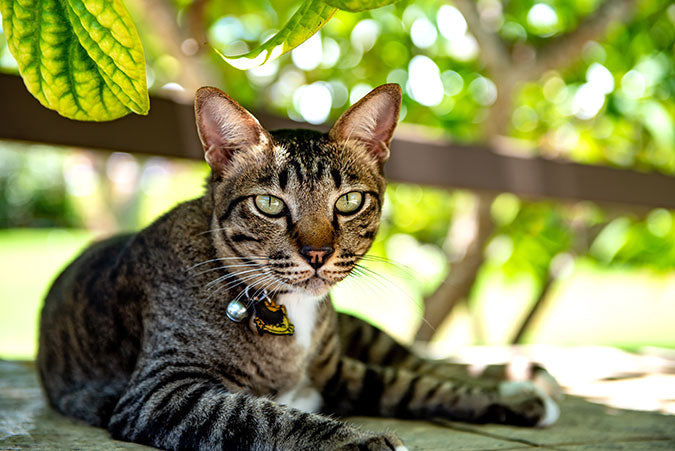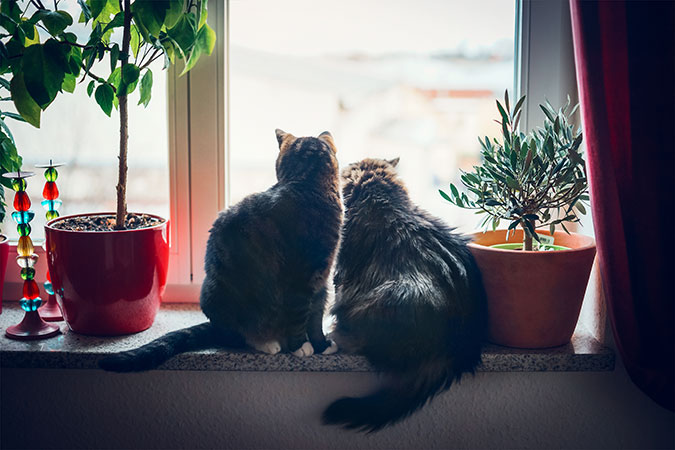Is My Cat Safe Outdoors?

Have you been wondering whether or not its safe to let your cat outside? Maybe they've been showing an interest in your backyard or have even tried to escape outside from time to time. If you've been wondering about whether it's safe to start letting your cat outside, keep reading to learn more about the differences between indoor and outdoor cats and how you can keep your cat outside safely!
INDOOR VS. OUTDOOR CATS
Are some cats better suited for living a life outdoors than others? Just like people, all cats are unique and have their own personalities. Some cats may come from a long line of barn cats who are used to hunting rodents and pests. Other cats are naturally more drawn to the outdoors, even those who are accustomed to indoor life.
Whether or not you have an "outdoor cat," there are several benefits to letting your cat play outside from time to time. It's a great way for them to get exercise and fresh air. It's also beneficial to their mental health since the outdoors provides plenty of entertainment and keeps their senses stimulated. This also allows them to tap into their natural instincts by doing things such as clawing at trees, watching for prey, and more.
However, there are also plenty of dangers to be aware of when it comes to letting your cat outside of the house. One of the top risks being cars and other vehicles. Another danger is exposure to harmful elements, such as chemicals sprayed in gardens or even plants that could be poisonous to them. Last of all, letting your cat outside without any kind of leash or containment could result in them wandering off and getting lost.
HOW TO KEEP YOUR CAT SAFE OUTDOORS
So, what's the best way to keep your cat safe outside? First, you should be sure that you live in a place where it is safe to let them out. Living near a busy street or near houses with other animals could pose a risk of injury. This is why it's important to have some form of containment, especially if you live in a busy neighborhood. Containment could be anything from having a fenced-in yard to using some form of a playpen to allow your cat a limited space to explore.
If you're planning on keeping your pet outside for an extended period of time, a shelter might also be a good option for them to give them a place of shade and a place where they can safely nap or stay protected from the elements.

It's also a good idea to be sure that your cat is wearing a collar with proper identification. Hopefully, your cat won't wander off, but if he or she does, you'll want to make sure your phone numbers and address are easily readable so that your kitty can be brought back home. Collars with bells are also a good idea. This will help your cat be heard by other people if they wander off, but will also alert birds or other wildlife if your cat is nearby. While hunting is a natural instinct for your cat, you don't want your cat attacking harmless creatures just for the fun of it.
Breakaway collars are another great collar option. Although they're designed to come off, this can be useful if your cat's collar becomes stuck on something while they're exploring. You may want to also consider having your cat microchipped, especially if they spend a lot of time outdoors.
Another thing to keep in mind is that your cat may have run-ins with other felines if left outside. This is why you should be sure that they are up-to-date on all of their vaccines and that they are also spayed or neutered. You don't want them to run the risk of picking up diseases or possibly becoming pregnant.
Lastly, if possible, keep your cat inside at night. While cats are nocturnal creatures, it is dangerous for them to be roaming around outside in the dark. Drivers won't easily be able to see them if they're crossing the street, so they run a greater risk of getting hit or injured. Coyotes also come out during the night and your cat risks becoming prey if they come across a group of coyotes.
HOW TO KEEP YOUR CAT HAPPY INDOORS
 If letting your cat outdoors is not a good option for you and your cat, there are plenty of ways to keep him or her happy inside! Enhance your indoor space with cat toys and elements such as trees, boxes, perches, or shelves for your cat to climb up and explore. Giving your cat access to sit near and look out windows is also a great idea! Just be sure that the window or screen will not easily open. You don't want your cat to fall or jump out of it! In addition to giving them a big of access to fresh air, you can bring a little bit of the outdoors inside with pet-friendly plants that your cat can bite or chew on.
If letting your cat outdoors is not a good option for you and your cat, there are plenty of ways to keep him or her happy inside! Enhance your indoor space with cat toys and elements such as trees, boxes, perches, or shelves for your cat to climb up and explore. Giving your cat access to sit near and look out windows is also a great idea! Just be sure that the window or screen will not easily open. You don't want your cat to fall or jump out of it! In addition to giving them a big of access to fresh air, you can bring a little bit of the outdoors inside with pet-friendly plants that your cat can bite or chew on.CONCLUSION
Overall, determining whether or not your cat will be safe outdoors depends on where you live and what kinds of elements you have in place to keep them contained and away from the dangers of the street and other animals. There are plenty of ways to make both the indoors and outdoors safe yet exciting for your kitty. Just be sure you're keeping an eye on them to make sure they are staying healthy and happy wherever they are!
Previous article

Next article

Related posts
View all-

What Can You Use Instead of Cat Litter?
Traditional cat litter is convenient, but it’s not the only option. Many cat owners look for alternatives to reduce waste, save money, or avoid chemicals found in clay-based kitty litter. Some options offer better odor control, while others are more eco-friendly or gentler on a cat’s paws.
Read Article -

How to Keep My Backyard Smelling Fresh
A clean backyard should smell fresh, unlike pet waste, smoke, or mold. Bad smells can linger, especially when dog poop, urine, or food scraps attract flies and bacteria. If your yard has a foul odor, it's time to take action. The first step is cleaning up pet feces, trash, or rotting food. A garden hose can wash away dirt and urine from artificial turf, patios, and decks. To neutralize odor, Use baking soda, white vinegar, and essential oils.
Read Article -

What Supplies Do First-Time Cat Owners Need?
Bringing home a new cat is exciting, but making them feel safe and comfortable takes more than love. First-time cat owners must prepare with the right supplies to ensure a smooth transition. From a litter box to cat food and a warm bed, having the basics ready can help your new kitty settle in faster. This guide covers everything a new cat owner needs to make their new pet feel at home.
Read Article



